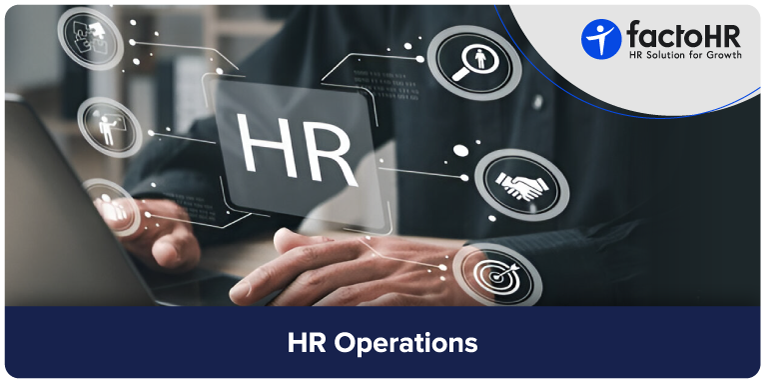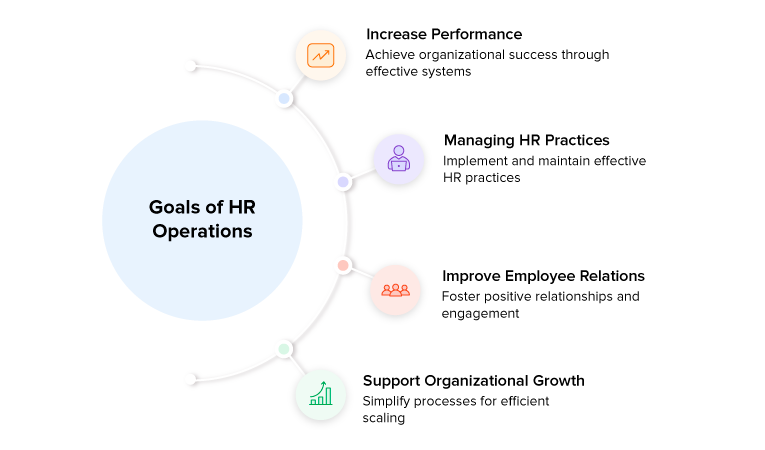What is HR Operations?

Table of Contents
Why did companies shift their focus from paper-based practices to digital solutions? This transition led to contemporary HR operations that are streamlined and efficient because of their advantages. Some of the primary processes in traditional HR included record-keeping and payroll processing. These practices created issues, including delayed workflows and manual errors. Traditional HR also encompasses challenges in managing employee data and ensuring compliance with relevant regulations.
Due to globalization and technological advancements, modern companies have come to understand the importance of HR automation. This guide outlines the fundamental aspects of HR operations, including core responsibilities, roles, and organizational structure. Challenges in human resources operations, along with their solutions, are also addressed in this guide.
What is HR Operations?
HR operations refer to the set of day-to-day activities and processes that support the functioning of the human resources department within an organization. Some of these tasks include managing employee records and processing payroll. Human resources operations ensure that HR processes run smoothly and enhance efficiency. Other functions, like benefits administration and compliance with labor laws, are also included.
HR operations are the backbone of the HR department, as HR professionals effectively manage routine tasks. This way, HR professionals can focus on other important tasks and improve overall productivity. Starting from onboarding to offboarding, these operations help support the entire employee lifecycle. HR operations can reduce errors and improve the accuracy of HR processes. When employees receive ongoing support in payroll and other HR-related aspects, it adds to a positive employee experience.

HR Operations vs. HR Management
Sometimes HR operations and HR management are used interchangeably. They have distinct roles and functionalities within an organization’s HR department.
- HR operations focus on day-to-day administrative and transactional tasks that support HR functions, whereas HR management primarily focuses on strategic planning functions, such as talent management and leadership development.
- HR operations tasks enhance the efficiency of core HR processes, particularly in terms of timely payroll and compliance with labor laws. When compared to HR management, HR strategies are developed and are aligned with the company’s overall goals to support its vision.
- HR operations also include managing a Human Resource Information System (HRIS) and overseeing employees’ data. HR management involves promoting employee engagement through a positive work environment and enhancing productivity.
- HR operations also manage practices, starting from recruitment to offboarding. When employees’ and HR-related data are maintained accurately, HR professionals can make informed decisions. HR management encompasses attracting and hiring top talent through competitive compensation packages and benefits.
The differences are presented in a table format to facilitate a clearer understanding of the concepts.
| Aspect | HR operations | HR management |
|---|---|---|
| Focus | Day-to-day HR administrative tasks | Creating strategic goals and aligning with organizational goals |
| Scope | Process-oriented | People-oriented |
| Objectives | Efficiency and compliance management | Managing the workforce for future growth |
| Approach | Reactive – Managing issues when they arise | Proactive – Planning before issues arise |
| Roles |
|
|

Core Responsibilities of HR Operations
Depending on the size of the organization, HR operation teams can have different roles and responsibilities. There are some general responsibilities when it comes to HR operations. These are:
Payroll Processing and Administration
HR operations manage the payroll of employees’ compensation, which includes salary structures and bonuses. Payroll Administration regular tasks, such as employee data entry, help processes run smoothly. When organizations have accurate and timely payroll processing, they can maintain proper compliance with various labor laws.
Employee Onboarding and Offboarding
Human resources operations manage an employee’s entire lifecycle, which starts from hiring to offboarding. This process includes hiring talent and integrating them into the organization. Retention can be increased by providing a complete employee onboarding process. The onboarding process can be carried out by ensuring that all necessary information is provided to employees and that the required paperwork has been completed. During the offboarding process, HR operations encompass procedures such as deactivating access systems and completing final payroll processing.
Benefits and Compensation Administration
HR professionals create salary structures, which include payroll and other forms of employee compensation. Some types of benefits administration programs, including health insurance and retirement plans, are also managed within human resources operations. This program also covers managing commissions and performance bonuses. Organizations can make decisions regarding workforce planning and stay compliant with labor laws.
Leave and Attendance Management
Some key responsibilities in HR operations include employee time tracking and managing leave requests. HR professionals can utilize a leave management system to effectively manage various types of leave, including vacation and sick leave, thereby increasing their efficiency. The HR operations ensure that the company adheres to labor laws related to leave and attendance management.
HR Documentation and Recordkeeping
Some core responsibilities of HR operations also include managing employee documentation to stay compliant with labor laws and protect companies from legal challenges. The types of HR documents include employment records and performance reviews. With proper and up-to-date HR information, organizations can protect themselves legally and maintain compliance.
HR Compliance and Policy Enforcement
HR operations conduct regular assessments and audits to identify areas of non-compliance. Companies can implement corrective measures regarding HR compliance to mitigate legal risks and penalties. HR teams should monitor country-specific labor laws during the hiring process and payroll processing to avoid non-compliance. HR professionals create and implement policies that align with legal requirements to ensure a fair work environment. They are also responsible for taking disciplinary actions for non-compliance within the organization.
Supporting Employee Lifecycle Processes
HR professionals play an essential role in managing all stages of the employee lifecycle. The process includes attracting qualified candidates and integrating new employees into the organization. HR professionals utilize an HRMS to review employee performance and identify opportunities for professional growth. Employee retention can be enhanced when their issues and conflicts are resolved, which also helps maintain a positive work environment.

What are the Goals of HR Operations?

HR operations have various goals that HR professionals are supposed to achieve. The following are some of the most important goals for further understanding.
Support Organizational Growth
One key goal of HR operations is to simplify processes such as recruitment and workforce planning. This way, organizations have the right talent and allocate resources appropriately. Organizations can scale efficiently as and when they grow by developing various strategies for human resources.
Improve Employee Relations
Organizations can increase their productivity when their employees are engaged and motivated. HR operations play a crucial role in maintaining a positive work environment and enhancing employee engagement by effectively resolving conflicts. This way, strong workplace relationships between employees and management can be maintained.
Managing HR Practices
When HR practices are implemented in an organization, they can help increase overall productivity and achieve performance results. One of the key roles of HR operations is to develop and maintain effective HR practices within an organization, as they play a crucial part in achieving results.
Increase Performance
With the help of performance management systems, employees can get regular feedback and track goals. HR operations can also help simplify workflows and increase productivity in an organization.

What are the HR Operations Roles and Structure?
HR operations encompass a range of roles and structures designed to facilitate the smooth execution of day-to-day processes. The following roles in HR operations are outlined below to provide a clearer understanding of the concept.
HR Operations Manager/Director
The HR operations team structure includes a manager or director who oversees the day-to-day management of HR processes, utilizing technology for support. This ensures that operations run efficiently and without delay. They manage HR administrative tasks and HR systems, helping to enhance the entire employee lifecycle.
HR Business Partner
An HR business partner, or HRBP, combines HR strategies with company goals to make sure that HR processes have an impact. They also provide guidance to business leaders to help achieve long-term goals. HR business partners work closely with managers and middle-level management to identify employee-related issues. It can help develop policies and maintain strong workplace relationships.
HR Coordinator/Assistant
The HR coordinator or assistant handles HR administrative tasks and helps in various HR processes. It includes providing support in recruitment processes and maintaining employees’ records. They also assist with tasks, such as responding to employee queries regarding HR policies and benefits. This way, they act as a bridge between employees and managers.
HR Generalist
HR generalists have a complex role in HR operations, which includes looking after administrative tasks and providing employee support. They manage HR processes, like making the onboarding process smooth and implementing a benefits administration system for evaluation. When employees have questions or concerns, HR generalists help resolve these problems and maintain employee relations. They also maintain proper compliance with labor laws and company policies.
Payroll and Benefits Administrator
A payroll and benefits administrator manages the payroll cycle by accurately calculating wages and making sure there are timely payments. They also oversee employee benefits programs to ensure their efficient management and administration. They help maintain accurate payroll processing and ensure compliance with labor laws to prevent non-compliance.
Learning and Development (L & D) Coordinator
Learning and development coordinators’ primary work focuses on planning and coordinating training programs. This enables employees to possess the necessary skills and abilities to perform their jobs effectively. L&D coordinator, with the help of HR professionals, identifies training needs and develops training programs. They also track employees’ progress in training and gather feedback to improve outcomes.
HR Systems Analyst
An HR systems analyst looks after the proper functioning of HR systems. These systems include managing the Human Resources Information System (HRIS) and identifying gaps in HR processes. HR professionals, with the help of HR technology, simplify processes to make informed decisions.
Employee Relations Specialist
An Employee relations specialist focuses on maintaining positive professional relationships between employees and the organization. They help resolve employees’ conflicts and maintain a positive work environment. When employees experience a conflict, an Employee Relations Specialist takes the lead in addressing the complaint.
Talent Acquisition Specialist
A Talent acquisition specialist’s key role is to identify and attract talent in the organization. They coordinate with hiring managers and HR professionals to understand the recruitment needs and develop strategies. Talent Acquisition Specialist work to build a strong talent pool within the organization and establish hiring strategies. They also conduct practices like screening resumes and conducting interviews to assess candidates.

Challenges in Human Resources Operations (and How to Solve Them)
Engagement and compliance management are constant challenges for any modern organization. The following are some of the challenges in HR operations, along with their corresponding solutions.
Repetitive Manual Processes
Manual data entry and payroll processing are some of the most time-consuming tasks for HR departments. Manual entries can lead to errors in calculations and compliance issues. The objective for HR professionals is to focus more on important tasks rather than wasting time on repetitive tasks. For example, when organizations have a manual attendance management system, they face issues like time theft and inaccurate data.
Solution: HR operations can help simplify some of the repetitive tasks, like attendance management and payroll processing. When manual processes are automated, HR professionals can focus on other important aspects within an organization. Human resources operations also help manage employee data and provide centralized dashboards with various reports. Third-party integrations are also available to centralize data and systems, allowing for easy access to information.
Compliance Complexity
Businesses struggle to monitor employment laws due to their constantly evolving nature. Local and national employment laws include many aspects, like the minimum wages of each state. It becomes difficult to stay up-to-date and compliant with all the rules and regulations. It is also important to maintain proper records related to employee information. Additionally, in cross-border teams with flexible work arrangements, maintaining compliance with international labor laws can be challenging.
Solution: HR compliance issues can be effectively managed through HR operations. It can manage documents and provide updated compliance-related data. HR professionals can get alerts for deadlines. Some regulatory changes can be implemented automatically, thereby reducing the need for human intervention. Provide training to employees and HR professionals to help them understand the changes in rules and regulations.
Siloed Systems and Poor Integration
Siloed systems and poor integration lead to inaccuracies, as the manual system needs manual data entry. When the data is not integrated correctly, the teams cannot communicate and collaborate effectively. Additionally, HR professionals are unable to make informed decisions due to incomplete data resulting from poor integration. Managing various software subscriptions can raise an organization’s costs.
Solution: The right HR operations software integrates all data related to core HR functions, such as attendance tracking and payroll processing. It allows open communication and collaboration between teams by sharing relevant information. To utilize the integrated HR systems effectively, train employees on how to use these systems and work efficiently within them.
Lack of Reporting and Visibility
Due to a lack of reporting, HR professionals may take time to make decisions in hiring or benefits administration. Sometimes, due to a lack of visibility, identifying patterns in employee-related data can also be difficult. Due to the delayed development of strategies, HR professionals are unable to take a proactive approach to different issues.
Solution: HR operations provide centralized data with real-time HR analytics and reporting to help HR professionals make informed decisions. It provides reports related to employee data and HR metrics, utilizing HR dashboards. These reports help to understand and predict outcomes in HR-related issues, such as talent management and employee engagement.
Delays in Employee Support
Sometimes, a lack of resources or inefficiency in processes leads to delays in employee support. Poor communication can also lead to slow processes between HR professionals and other departments. Employees feel stressed when there is a long response time and unresolved issues. This also leads to decreased productivity and damage to a brand’s reputation.
Solution: HR operations provide tools like an employee help desk, which allows employees to discuss their issues and track them on a single platform. In HR operations, some routine queries about employees can be solved with the help of chatbots. Additionally, an employee self-service portal enables employees to manage their own information and submit leave applications. This way, HR professionals can save time and focus on other important tasks.

How Can HR Tech Help with HR Operations?
By using HR tech, HR operations can be transformed, as it enhances efficiency and maintains proper compliance. Below are some ways in which HR tech supports human resources operations.
Automation of Repetitive Tasks
HR tech can automate some of the repetitive tasks, like payroll processing and benefits administration. When routine tasks are automated, HR professionals have more time to focus on other important tasks. Other tasks include the recruitment and selection process, which is assisted by an applicant tracking system (ATS). In performance management, HR tech can automate performance reviews, which makes the feedback process more simple.
Self-Service Platforms
Self-service portals allow employees to access and update their personal information. They can apply for leave or submit receipts for reimbursement, which helps reduce the workload of HR professionals. With the help of HR technology, organizations can increase employee engagement by providing features, like recognition programs and a learning management system.
Integrated HR Systems
Integrated HR systems help centralize data and improve its accuracy. When HR systems are integrated, like attendance and payroll, it can simplify data integration. The need for manual entry is reduced, and HR professionals’ work efficiency is increased. Large businesses with multiple shifts and a larger number of employees benefit the most, as data is available centrally.
Real-Time Data and Analytics
Data insights can enhance HR operations by enabling informed decision-making and streamlining HR processes. Analytics help HR professionals understand trends and patterns, allowing them to take corrective actions. In trend analysis, such as employee performance and training outcomes, HR professionals can identify outdated programs and initiatives. This way, they can develop effective training programs to enhance employees’ skills. In recruitment, candidate quality and time-to-hire metrics can be used to inform and adjust recruitment strategies.
Compliance Support
HR tech helps organizations stay compliant with labor laws and regulations. This way, organizations can reduce the risk of legal and financial penalties. Employment laws and minimum wages are some examples when it comes to compliance.
Scalability and Consistency
HR operations can streamline core HR processes and ensure compliance as a company expands. When routine tasks are automated, HR can focus on other important tasks, resulting in increased productivity. HR tech can adapt to changes in the workforce and market trends, such as the adoption of AI-powered tools and predictive analytics. It helps HR professionals develop various strategies and make informed decisions. Policies are formulated with consideration for compliance with national and international laws.

Conclusion
HR operations play a crucial role in any organization, regardless of its size. It helps HR professionals manage their day-to-day operations and employees by enhancing their entire lifecycle. This way, it helps companies achieve their goals and move towards success. In HR operations, when the right strategy is applied, it can improve employee relations and increase productivity.
HR professionals, with the help of HR operations, can simplify core HR processes. They can invest their resources in other important tasks and increase overall productivity. This demonstrates that investing in modern HR tools, such as factoHR’s HRMS automation, can help simplify operational workflows. Its user-friendly platform allows HR professionals to improve overall productivity and create a culture of innovation. Schedule a demo now to know more!
Grow your business with factoHR today
Focus on the significant decision-making tasks, transfer all your common repetitive HR tasks to factoHR and see the things falling into their place.

© 2026 Copyright factoHR


